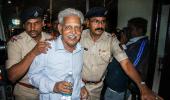A Pune court on Saturday remanded rights activists Sudha Bharadwaj, Vernon Gonsalves and Arun Ferreira, accused of having Maoist links, in police custody till November 6.

Bharadwaj, under house arrest in Faridabad, was taken into custody by police on Saturday morning and brought to the court.
Gonsalves and Ferreira had been taken into custody by Pune police on Friday evening after the court rejected the bail applications of all three, observing that the material collected by the police, on the face of it, shows their alleged links with Maoists.
District and Sessions Judge K D Vadane sent Gonsalves and Ferreira in police custody till November 6 after they were produced in the morning. The judge remanded Bharadwaj in police custody for the same period when she was produced in the evening.
Public prosecutor Ujjwala Pawar argued that as all the accused were under house arrest (as per the Supreme Court’s directions), they could not be interrogated, so their police custody was needed.
Seeking their police custody for 14 days, Pawar told the court that the preliminary investigation has revealed that the three had links with the banned CPI-Maoist and were involved in recruitment as well as raising funds for Maoist activities.
They were involved in a “larger conspiracy to threaten the democratic set-up of the nation”, Pawar told the court.
The Pune police arrested Ferreira, Gonsalves, Bharadwaj and two others -- Telugu poet Varavara Rao and activist Gautam Navlakha -- in August this year in connection with the probe into violence in Koregaon Bhima in Pune on January 1 this year.
Gonsalves and Ferreira were brought to Pune from their residences in Mumbai on Friday after the bail pleas were rejected by the court. Their four-week period of house arrest also ended on Friday.
Interestingly, Bharadwaj filed an application in the court Saturday in which she said she suffered from high blood sugar and some other health issues, and she should be provided the same facilities in jail which the government had “promised” to fugitive businessman Vijay Mallya.
The court ordered that the required medical facilities be provided to her.
Opposing the police custody, defence lawyer Rahul Deshmukh, who represented Gonsalves, argued that the police in their remand report have not mentioned that they need to recover any material from the accused.
“The material seized earlier is already in their possession for nearly two months now,” he said. “So there is no need for police custody,” he said.
Citing a CrPC section, he argued that the house arrest of all these accused was nothing but a “judicial custody”.
“While seeking the police custody of the accused, who are already in judicial custody, the prosecution needs to submit an affidavit before the court. But in this case, no affidavit was submitted, so there is no need to give police custody,” Deshmukh said.
Advocate Siddharth Patil, representing Ferreira, argued the period of the house arrest specified by the SC was valid till midnight of October 26.
“However, police took both the accused into the custody before the expiry of the house arrest, which is contempt of court,” he contended.
Deshmukh said that he would go through the order copy and challenge the police custody in the high court.










